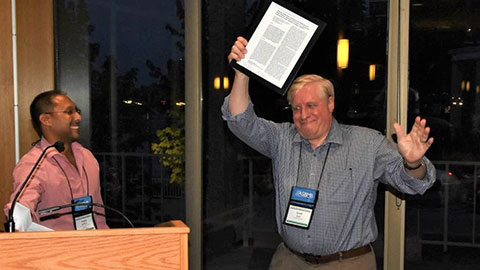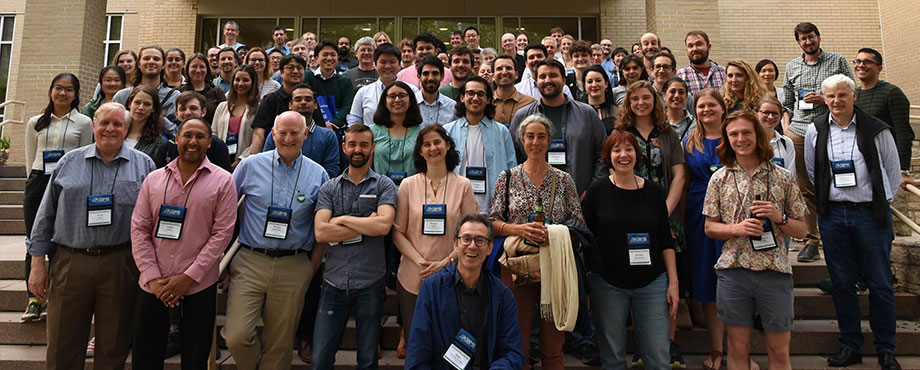Emr receives lifetime achievement award for ESCRT work
Scott Emr, a professor at Cornell University, got a lifetime achievement award in May during the American Society for Biochemistry and Molecular Biology’s meeting on ESCRT biology in Madison, Wisconsin.
Endosomal sorting complexes required for transport, or ESCRTs, are sets of proteins that enable vesicles to bud out from, rather than into, the cytoplasm. They are required for formation of vesicles within endosomes, some types of viral envelope budding and release, and the final steps of cell division.

"Scott is generally acknowledged as the 'father' of our field, having discovered many of the ESCRT factors in yeast and defining their subcomplexes and different functions," meeting co-organizer Wes Sundquist of the University of Utah told ASBMB Today. Over the years, Emr's lab has identified more than a dozen ESCRT proteins in yeast and illuminated their roles in decoding lipid phosphorylation patterns, sorting cargo and bending membranes into new shapes.
Emr has been carrying out his research for four decades as a professor at the Caltech, the University of California, San Diego, and most recently Cornell’s Weill Institute for Cell & Molecular Biology, where he served as director.
He won last year's Shaw Prize in Life Science and Medicine and the ASBMB's Avanti Award in Lipids in 2007 and is an elected member of the National Academy of Sciences, the American Academy of Arts and Sciences and the American Academy of Microbiology.
He’s been a member of the ASBMB since 1991.

Enjoy reading ASBMB Today?
Become a member to receive the print edition four times a year and the digital edition monthly.
Learn moreGet the latest from ASBMB Today
Enter your email address, and we’ll send you a weekly email with recent articles, interviews and more.
Latest in People
People highlights or most popular articles

From humble beginnings to unlocking lysosomal secrets
Monther Abu–Remaileh will receive the ASBMB’s 2026 Walter A. Shaw Young Investigator Award in Lipid Research at the ASBMB Annual Meeting, March 7-10 in Washington, D.C.

Chemistry meets biology to thwart parasites
Margaret Phillips will receive the Alice and C. C. Wang Award in Molecular Parasitology at the ASBMB Annual Meeting, March 7-10 in Washington, D.C.

ASBMB announces 2026 JBC/Tabor awardees
The seven awardees are first authors of outstanding papers published in 2025 in the Journal of Biological Chemistry.

Decoding how bacteria flip host’s molecular switches
Kim Orth will receive the Earl and Thressa Stadtman Distinguished Scientists Award at the ASBMB Annual Meeting, March 7–10, just outside of Washington, D.C.

Thiam elected to EMBO
He was recognized during the EMBO Members’ Meeting in Heidelberg, Germany, in October.

The timekeepers of proteostasis
Learn about the cover of the winter 2026 ASBMB Today issue, illustrated by ASBMB member Megan Mitchem.
